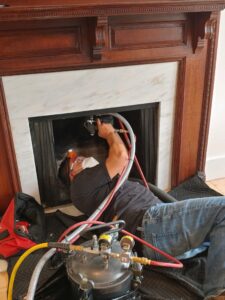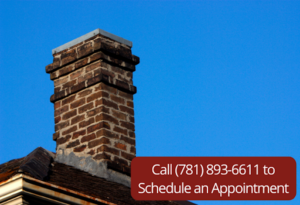What’s Involved in a Chimney Inspection?
Every homeowner with a chimney should know that chimney inspections are important. It is helpful for homeowners to understand what is involved in a chimney inspection in order to understand just how important inspections are for use. Today, we’ll be describing the process of a chimney inspection and why you should have your chimney inspected.
Have you had your chimney inspected yet this year? Our team serves the Greater Boston, MA area and we’re ready to help you! At Best Chimney Services, we’re a full-service chimney company offering everything from chimney inspections and sweeps to other residential and commercial chimney services. Click here or call (781) 893-6611 to get in touch with us.
 When to Have Your Chimney Inspected
When to Have Your Chimney Inspected
Chimney inspections are recommended annually, when you are selling or transferring your property, if there has been an operating malfunction, or if you are replacing a chimney vented appliance. Our team of technicians are certified by the Chimney Safety Institute of America and follow strict guidelines to ensure that chimneys are worthy of use.
Process of a Chimney Inspection
There are three different chimney inspections available.
Level I Chimney Inspection
Section 14.2 of NFPA 211 requires that level I inspections take place annually. Level I chimney inspections are also performed prior to a routine sweeping of the chimney flue, or when chimney vented appliances are replaced. A level 1 inspection will not certify that the flue is ready for use.
During a Level I chimney inspection, we visually examine portions of the chimney and venting system that are readily accessible. Some of the issues that we look for include obstructions or combustible deposits in the flue, appliance installation and connection, signs of water penetration, and the integrity of the chimney’s masonry.
 Level II Chimney Inspection
Level II Chimney Inspection
Level II inspections are a more in depth inspection than a level I. They are necessary when you’d like to know if the flue is worthy of use, when property is being sold or transferred, or after an operating malfunction that has most likely damaged your chimney. A level II inspection does include all aspects of a level I inspection, but also includes a camera scope of the flue in its entirety with pictures of condition. We look out for obstructions or combustible deposits in the flue and make sure the lining is intact and in good condition. We also focus on ensuring that there are proper clearances from combustibles in locations that are accessible and that the flues of chimney vented appliances are the proper size. For more details, check out our guide to Level II chimney inspections.
Level III Chimney Inspection
These inspections are only necessary in very specific circumstances. During level III inspections, we access both internal and external portions of the chimney, remove parts of the building or chimney, only as needed to access areas that are necessary to inspect. These types of inspection aren’t typically needed on routine stops and all aspects of the other two inspections must be performed first.
Click here for more details on the three types of chimney inspections we offer.
Hire Our Boston, MA Area Team to Inspect Your Chimney
You should have your chimney inspected once a year, when you’re selling your home, or if there has been a malfunction of some kind. If your chimney is in need of an inspection, be sure to get in touch with our team of professionals. Click here or call (781) 893-6611 to schedule an appointment or ask questions.
The post What’s Involved in a Chimney Inspection? appeared first on Boston's Best Chimney.